 Petzlover
Petzlover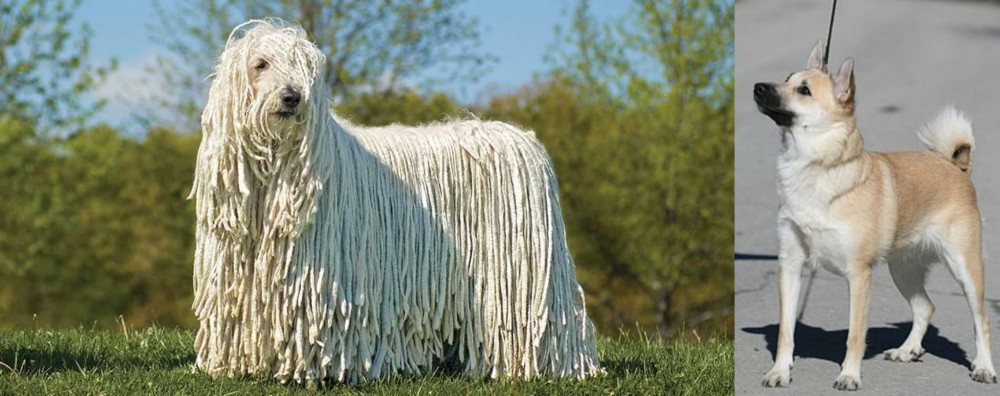 Komondor is originated from Hungary but Norwegian Buhund is originated from Norway. Komondor may grow 29 cm / 12 inches higher than Norwegian Buhund. Komondor may weigh 42 kg / 93 pounds more than Norwegian Buhund. Komondor may live 3 years less than Norwegian Buhund. Komondor may have more litter size than Norwegian Buhund. Komondor requires High Maintenance. But Norwegian Buhund requires Moderate Maintenance
Komondor is originated from Hungary but Norwegian Buhund is originated from Norway. Komondor may grow 29 cm / 12 inches higher than Norwegian Buhund. Komondor may weigh 42 kg / 93 pounds more than Norwegian Buhund. Komondor may live 3 years less than Norwegian Buhund. Komondor may have more litter size than Norwegian Buhund. Komondor requires High Maintenance. But Norwegian Buhund requires Moderate Maintenance
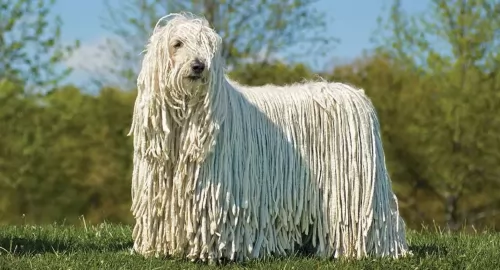 Looking like a giant mop, and sometimes being referred to as 'mop dogs' the Komondor, known also as the Hungarian sheepdog, hails from Hungary.
Looking like a giant mop, and sometimes being referred to as 'mop dogs' the Komondor, known also as the Hungarian sheepdog, hails from Hungary.
The dog was brought to Europe centuries ago so he is a well established breed. It has been declared as one of the country's national treasures.
He is a dog related to many other dogs such as the Pulim the Ovcharka, the Bearded Collie, Old English Sheepdog and others.
 The Norwegian Buhund is a spitz type dog belonging to the herding group of dogs. The dog is related to the Icelandic Sheepdog and the Jämthund.
The Norwegian Buhund is a spitz type dog belonging to the herding group of dogs. The dog is related to the Icelandic Sheepdog and the Jämthund.
This dog breed dates back thousands of years to Nordic Viking times. For centuries these dogs have served working dogs, being herders as well as guardians of flock. Even today in remote parts of Norway, you’ll still find this dog doing farm work.
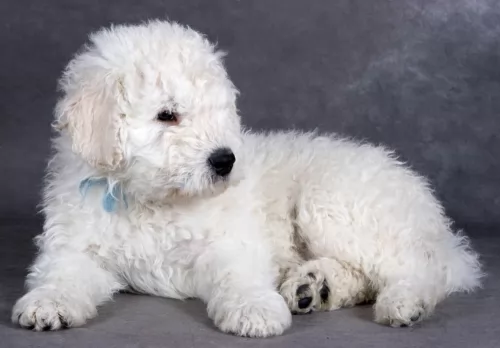 Known for his unique long corded, singular white coat, the Komondor, a molosser dog, is large. Females start at 64cm in height and both males and females can reach up to 76cm in height.
Known for his unique long corded, singular white coat, the Komondor, a molosser dog, is large. Females start at 64cm in height and both males and females can reach up to 76cm in height.
This unusual coat of theirs is wavy and actually forms cords or dreadlocks as the dog matures. You can't easily see the dog's face because of all the hair.You also can't see the tail easily, in fact you might think he hasn't got a tail as it is obscured by the hair. The tail is medium length and held low.
He has a large head, dark brown eyes, and floppy ears. The coat is certainly going to require grooming even though the dog doesn't shed much. His body is robust and well muscled with the body being slightly longer than the height of the dog.
The Komondor has been a dog used for guarding livestock, and while his character is calm and balanced, when the livestock is threatened, he can show another side – more aggressive – as he defends his flock. He makes an excellent watchdog.
He is an affectionate dog with his human family, being a gentle playmate of children. He is slightly reserved and wary of strangers, and is willing to guard and protect his human family from them.
He is also good with other family pets. When you look at him you might think of him as not being very energetic, but he is an athletic dog, fast and powerful. Because of his size and speed, it is best to have him trained and socialized as he can be obstinate. Training him makes him obedient.
 The Norwegian Buhund stands at 41 to 47cm in height both male and female. He is a medium sized dog and weighs between 12 and 18kg.
The Norwegian Buhund stands at 41 to 47cm in height both male and female. He is a medium sized dog and weighs between 12 and 18kg.
Known as a herding dog, he is described as being deep chested with a well built, compact body, erect ears and a tail which curves over the back. The head of the dog is wedge-shaped and he has a bright, intelligent look to him.
The coat is essentially a wheaten color but it can be other shades such as a pale cream color to bright orange and sometimes even black. The coat is short to medium in length and he sheds moderately with some seasonal shedding as well.
Fun loving, friendly and social, the Norwegian Buhund is also an active dog who will always be pleading with you for a game or walkies. His pleading brown eyes will hopefully soften your heart towards him so that you give him a ball game or a run in the park. It is why this dog breed gets on well with children – he loves to be playing games with them.
They are such lovable dogs, wanting to spend time with their human family and always ready with a doggy kiss. They want to protect the ones they love and this makes them good watchdogs too, being wary around strangers. He is highly intelligent and will go through training and socialization with ease.
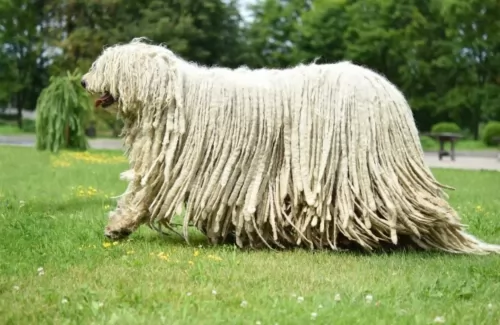 The Komondor is known for his strong guardian characteristics, especially with his human family. He is loving and loyal towards them while being wary of strangers.
The Komondor is known for his strong guardian characteristics, especially with his human family. He is loving and loyal towards them while being wary of strangers.
True, his coat can make people think twice before making this dog a pet, but if you're game and ready to attend to his coat, he can make an excellent family pet. They're fine with other pets too, and he is also an intelligent dog, capable of being easily trained.
He needs a good deal of exercise and can become noisy and destructive without the right amount of stimulation. If you do your part with the Komondor and provide him with a loving, caring home, he will be an awesome pet and guard you with his life.
 He will need exercise on a daily basis. They are lovable dogs and are affectionate towards children in the home. They form strong bonds with their human family.
He will need exercise on a daily basis. They are lovable dogs and are affectionate towards children in the home. They form strong bonds with their human family.
He is a strong willed dog, and will require training and socialization. As a working and herding dog, he wants to be busy, and is perhaps best suited to life in the suburbs or countryside as opposed to living in the city.
He makes an awesome companion dog and he wants to please his human family and be an active part of their lives.
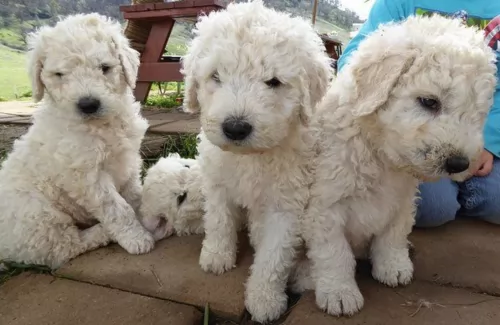 The Komondor is a healthy dog breed who can live to be 10, 11 or 12 years if you look after him well. There aren't any known genetic disorders prominent with the dog, but it pays to know about some of those that could strike -
The Komondor is a healthy dog breed who can live to be 10, 11 or 12 years if you look after him well. There aren't any known genetic disorders prominent with the dog, but it pays to know about some of those that could strike -
This is an irritating eye problem where the eyelash rubs up against the eyes.The result can be scratching of the cornea and eye infections. It is an eye problem which can be corrected with surgery.
Hip dysplasia is a serious genetically inherited disorder and common in large dog breeds. It is caused by a malformation of the hip joint. It can cause problems for the dog, weakening the hip and making it incapable of supporting the weight of the dog.
It also leads to pain for the dog, difficulty with moving and even total lameness. Weight, size of dog, age and genetics are all factors which can increase the dog's likelihood of developing hip dysplasia.
Whimpering, lethargy and refusing to put weight on the leg are common signs of hip dysplasia and your vet will go ahead with ways to relieve the pain and symptoms of your Komondor.
 Provide your Norwegian Buhund with the right care and he can get to 15 years of age. Hip dysplasia is always an issue with dogs and you should be very wary of it as it can cause lameness and pain.
Provide your Norwegian Buhund with the right care and he can get to 15 years of age. Hip dysplasia is always an issue with dogs and you should be very wary of it as it can cause lameness and pain.
Cataracts is another illness that you want to be aware of. Although not painful, this eye aliment can lead to blindness.
Look out for other common dog illnesses such as bloat, skin allergies and cancer.
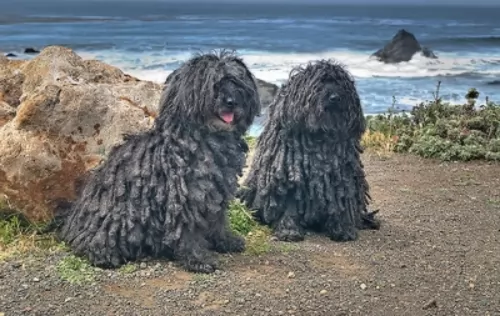 The Komondor is most certainly not a low maintenance dog with that extraordinary coat.Before the dog turns 1, the coat begins to form its cords. These cords can become discolored and matted, In fact the cords will need to be separated to keep the dog clean and free of matted hair.
The Komondor is most certainly not a low maintenance dog with that extraordinary coat.Before the dog turns 1, the coat begins to form its cords. These cords can become discolored and matted, In fact the cords will need to be separated to keep the dog clean and free of matted hair.
For those who keep the dog as a pet and who don't want him to be a show dog, he can be trimmed, otherwise the coat and its maintenance could turn out to be a real issue.
Of course once the distinctive coat has been sheared, he loses that typical and recognizable Komondor look.
Check his ears on a regular basis for wax- and dirt buildup so as to prevent ear infection.
Teeth need to be checked regularly to prevent tartar buildup and if you don't have the time or the knowledge to keep his teeth clean and maintained, take him to the vet as the teeth-treatments they do there will promote healthy teeth and gums.
 You’re going to need to provide this dog of yours with activities that stimulate him physically and mentally. The Norwegian Buhund isn’t a couch-potato type of dog and he doesn’t do well with just lying around. Take him on walks and hikes, throw balls or frisbees for him and buy him some toys that can entertain him. You want to avoid him barking and digging from sheer boredom.
You’re going to need to provide this dog of yours with activities that stimulate him physically and mentally. The Norwegian Buhund isn’t a couch-potato type of dog and he doesn’t do well with just lying around. Take him on walks and hikes, throw balls or frisbees for him and buy him some toys that can entertain him. You want to avoid him barking and digging from sheer boredom.
Like all other spitz-breed dogs, the Norwegian Buhund has a thick double coat, and because he sheds moderately, you will need to brush him at least twice a week. Check simultaneously for ticks and fleas.
Check your pets eye and ears for infection and check his teeth. A rotting tooth at the back of his mouth can be the cause of a lot of pain and problems throughout the body. Keep his nails clipped as well so as to prevent them hooking onto things.
Provide your pet with a nice warm, dry, comfortable place to sleep. If he goes outside, make sure he has a place to lie in the shade or in the sun.
Take your pet to the vet when he appears to be lethargic and sick. Remember to keep his vaccines up to date.
Feed your pet food which is known for its nutritional value. Home made food is a real treat for your pet, but high quality commercially manufactured food can be good and convenient too.
Dogs love simple, consistent diets which don’t upset their stomachs. Boiled chicken, brown rice or pasta, and some vegetables such as sweet potatoes, spinach and carrots chopped up into his food from time to time can be superbly nutritious for your pet. Try and also include a little bit of raw meat occasionally. Always have a bowl of fresh, cool water available to your pet.